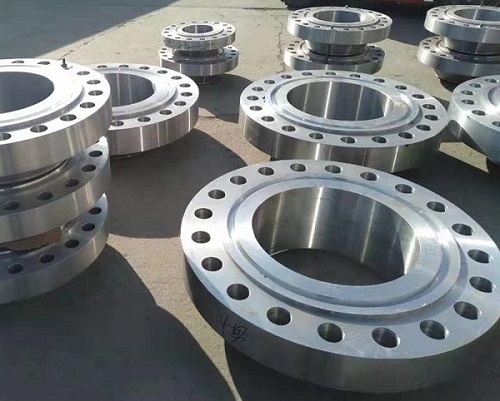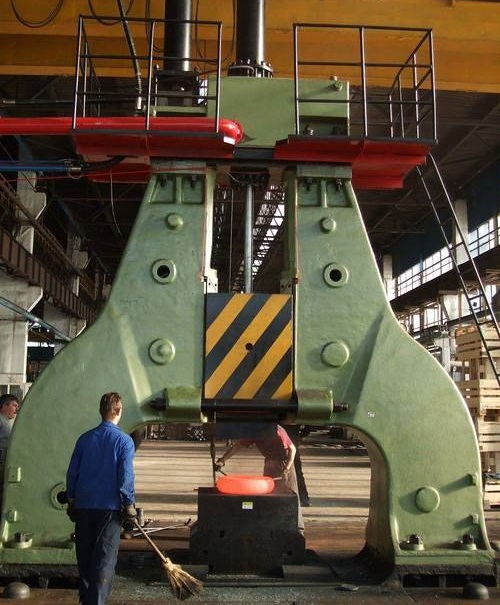Categories
- Pipe & Tube (18)
- Flange & Fitting (97)
- Fastener & Gasket (12)
- Valve & Pump (18)
- Base Material (11)
- Equipment (8)
- Application (30)
- Technical (110)
ASTM A350 Grade LF6 is a vanadium microalloyed steel, which is a derivative of the high-strength low-alloy (HSLA) steel family. The ASTM A350 LF6 forging is primarily used for the manufacture of various piping components covering forged flanges, forged fittings (ASME B16.11) and valves requiring notch toughness testing. There are three classes of Grade LF6 available as per ASTM A350: Class 1, Class 2 and Class 3. They are determined by its strength and toughness requirements.
Although it has minor effect on ferrite grain refinement, the micro-alloyed vanadium readily binds with the deliberate addition of nitrogen to form fine grain vanadium-rich precipitates first as nitrides, then carbonitrides, and finally carbides once all nitrogen is used. This is the classical precipitation strengthening process, which significantly improves the strength and impact toughness of the steel while maintaining cost effective due to “micro” addition of the alloying elements.

Forged WN RTJ flanges made to ASME B16.5 Class 900. Supplied to Manama, Bahrain.
ASTM A350 LF6 piping components, either forged flanges, forged fittings or valves shall be made to specified dimensions, or to dimensional standards such as ASME B16.5, ASME B16.47, ASME B16.9, ASME B16.10, ASTM B16.11, ASME B16.30, ASME B16.34, API 600, API 602, and API 605. However, ASTM A350 LF6 is not an approved steel grade by ASME Code. Neither ASME BPVC nor ASME B16 endorses the used of it. Custom design calculation shall be performed when it is applied.
| ASTM A350 LF6 | Composition, Wt. % |
|---|---|
| C | ≤0.22 |
| Mn | 1.15-1.50 |
| P | ≤0.025 |
| S | ≤0.025 |
| Si | 0.15-0.30 |
| Ni | ≤0.40 |
| Cr | ≤0.30 |
| Mo | ≤0.12 |
| Cu | ≤0.40 |
| Nb | ≤0.02 |
| V | 0.04-0.11 |
| N | 0.010-0.030 |
| Tensile & Hardness | Properties Class 1 | Properties Class 2 & 3 |
|---|---|---|
| Tensile Strength MPa [ksi] | 455-630 [66-91] | 515-690 [75-100] |
| Yield Strength min. MPa [ksi] | 360 [52] | 415 [60] |
| Elongation in 2", min. % | 30 | 28 |
| Reduction of Area min. % | 40 | 40 |
| Hardness max. HBW | 197 | 197 |
The Charpy V-notch impact test shall be performed for each heat lot of the ASTM A350 LF6 forgings. The testing specimens shall be prepared in the standard size of 55mm x 10mm x 10mm, three pieces per test set. The standard impact test temperature shall be -51°C [60°F] for Class 1 and Class 2 of LF6, and -18°C [0°F] for Class 3 of LF6. Minimum impact energy required for average of each set of three specimens (Eave) shall be recorded. Minimum impact energy permitted for one specimen only of a set (Eea) shall also be recorded. The Eave and Eea for ASTM A350 LF2 Class 1 are 20J and 16J, respectively, while the Eave and Eea for ASTM A350 LF2 Class 2 & 3 are 27J and 20J, respectively.

The open die forging for the manufacture of ASTM A350 LF6 flanges in our factory’s premise in Shanxi province.
ASTM A350 LF6 starting materials (billets & bars) are generally procured from TISCO, which is produced by the vacuum-induction melting process and refined by secondary melting using vacuum-arc remelting (VAR). The steel shall be fully killed and fine-grain practice. After cutting the billet to specific size, the hot forging process shall be performed. It shall be reheated to 1260°C [2300°F], with hot working continuing to 815°C [1500°F] and water spray or air blow cooling to 650°C [1200°F]. At the option of the manufacturer, ASTM A350 LF6 forgings shall be furnished with the heat treatment of either normalizing (at 920°C) and tempering (at 650°C), or quenching (at 910°C) and tempering (at 590°C).
